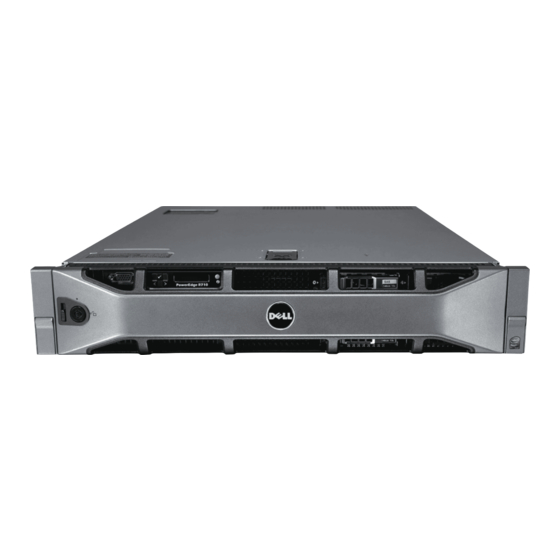The DS2 driver application creates an orders-per-minute performance counter on each client machine. While the
DVD Store client application visually outputs OPM at 10-second intervals, we chose to collect this OPM metric via
a performance monitor counter on each client machine at 1-second intervals.
For more details about the DS2 tool, see
We ran this workload on the Dell PowerEdge R710 server and the HP ProLiant DL385 server for 30 minutes.
Our test case modeled a typical enterprise datacenter with multiple legacy HP ProLiant DL385 solutions running
high-demand database workloads. The enterprise in this test case seeks to consolidate the workloads of seven of
these legacy systems onto a Dell PowerEdge R710 solution that runs VMware ESX and wants to yield a payback
in under 18 months. The enterprise seeks to balance performance and cost.
We ran the DS2 benchmark to verify that, using our test workload, the newer solution would outperform the seven
legacy systems it would replace. We tested each legacy system and each VM on the newer solution with a 10GB
database. Each VM on the newer system delivered better performance than did a single legacy system with the
same workload. We then estimated the monthly costs for maintaining the seven legacy and single new system
and estimated the payback period for the investment in the newer solution.
To model this test case, we did not compare identical solutions but instead configured the newer solution with
sufficient processors, memory, and storage to not only match or improve on the performance that the legacy
solutions deliver for the test workload but also yield a payback in under 18 months.
We selected 4GB RAM for the legacy systems as it is a realistic amount of memory for a 4 year old system. We
configured the newer solution as we expect an IT manager would when purchasing a Nehalem-based database
solution intended to replace seven HP ProLiant DL385 solutions running the high-demand databases modeled by
our workload. We selected and priced a Nehalem-based server with two processors, 96GB RAM, and modern
storage. As we expect an IT manager would, we balanced performance and cost to define the newer
configuration.
We used nearly the maximum available memory per VM that the new server could support with 96 GB (8 GB x
12) of memory, allocating 12GB of memory per VM for a total allocation of 84GB for the seven VMs. We expected
that the IT administrator in our test case would take advantage of the memory capacity of modern servers in order
to improve performance and consolidation and would select 12GB of memory per VM, enough memory that the
10GB database would be likely fit into memory,
We tested the legacy solution with HP StorageWorks MSA30 storage, which had 14 146GB 10,000 RPM disks.
We configured the newer solution with modern storage selecting a Dell™ EqualLogic PS6000XV storage array
with 15 450GB 15,000 RPM disks. The list price for that array is $55,000. We assumed that the solution we
modeled would require half that storage and include the half the costs of the storage array, including $27,500 of
the investment costs, in the payback analysis.
We tested the legacy system with 4-year old software versions and the newer system with current software
versions, assuming that the IT department in the test case would take advantage of the performance benefits of
newer software. We tested the Dell PowerEdge R710 solution running VMware vSphere 4 Advanced
ProLiant DL385 solution running Windows Server 2003 R2 Enterprise Edition. We tested the Dell PowerEdge
R710 solution with Microsoft SQL Server 2008 Enterprise Edition and the HP ProLiant DL385 solution with
Microsoft SQL Server 2005. We installed Windows Server 2008 Enterprise Edition and Microsoft SQL Server
2008 in each VM on the Dell PowerEdge R710.
5
We tested with a vSphere 4.0 prior to product release using a build from the post release candidate timeframe. We anticipate that the
performance we saw with that build will be very close to that of the released product.
Principled Technologies, Inc.: Initial investment payback analysis: Dell PowerEdge R710
solution with VMware ESX vs. HP ProLiant DL385 solution
http://www.delltechcenter.com/page/DVD+Store
5
and the HP
5

